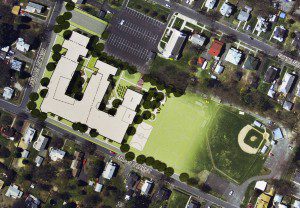 BOSTON – On Thursday, the Supreme Judicial Court of the Commonwealth of Massachusetts heard oral arguments for and against the proposed Cross Street site for a new elementary school for the City of Westfield.
BOSTON – On Thursday, the Supreme Judicial Court of the Commonwealth of Massachusetts heard oral arguments for and against the proposed Cross Street site for a new elementary school for the City of Westfield.
City solicitor Susan Phillips and Mayor Brian P. Sullivan attended the hearing for the City of Westfield.
Plaintiffs Thomas Smith, his brothers, “families, friends, neighbors, and the many Cross St. playground state-wide supporters” also attended, wrote Smith in an email.
Phillips said the court was well-prepared for the hearing, having read all of the briefs. Each side got fifteen minutes to state their case. Phillips said the plaintiffs gave up seven minutes of their time to the Attorney General’s office.
“It went better than I expected,” Phillips said.
Mayor Sullivan said as a fan of history he was interested in watching the court in action. “It was kind of cool, being in Boston, the court house, the history,” Sullivan said. He said it was all over in a half an hour. “We waited in the hallway longer than in the court room,” he added.
Smith wrote that the plaintiffs were “most appreciative to have had a wonderful experience and opportunity in Boston to defend the causes of justice, fairness, and in equal distribution of the application of our land protection laws.“
The case ultimately rests on the interpretation of Article 97, and whether the 1.37 acres of the playground adjacent to the former Ashley St. school property to be taken for the school building project is Article 97 protected land.
According to Sullivan, the court will decide whether to change the current law which to date, has upheld the City’s position that the one plus acre parcel is not dedicated parkland and subject to protection under Article 97 of the State Constitution.
Sullivan went on to say that he is hopeful that the Court upholds the current law and allows this needed project to move forward. “This issue is of great importance to cities and towns who must have certainty and control over the use of non-dedicated land. To suggest that the Legislature should make these purely local decisions is not in the best interest of the City of Westfield,” he said.
“Yesterday’s hearing pronounced our efforts to seek justice. Any outcome of the hearing cannot deny that the State of Massachusetts’ publicly funded and managed recreational open spaces have been under serious assault for many years,” said Smith on behalf of the plaintiffs, saying that effort “was met with a spirited, stubborn, and justified resistance this time.”
“With large and available School Department parcels available to build a new school upon, that if selected, a new school could have opened in 2014, we hope our efforts will prompt the voters of Westfield to seek and assess the City’s true political motives,” Smith added.
Sullivan said they were given no indication of when there might be a decision made by the court in the case. “Now we sit and wait. Very much no indication,” Sullivan said.

